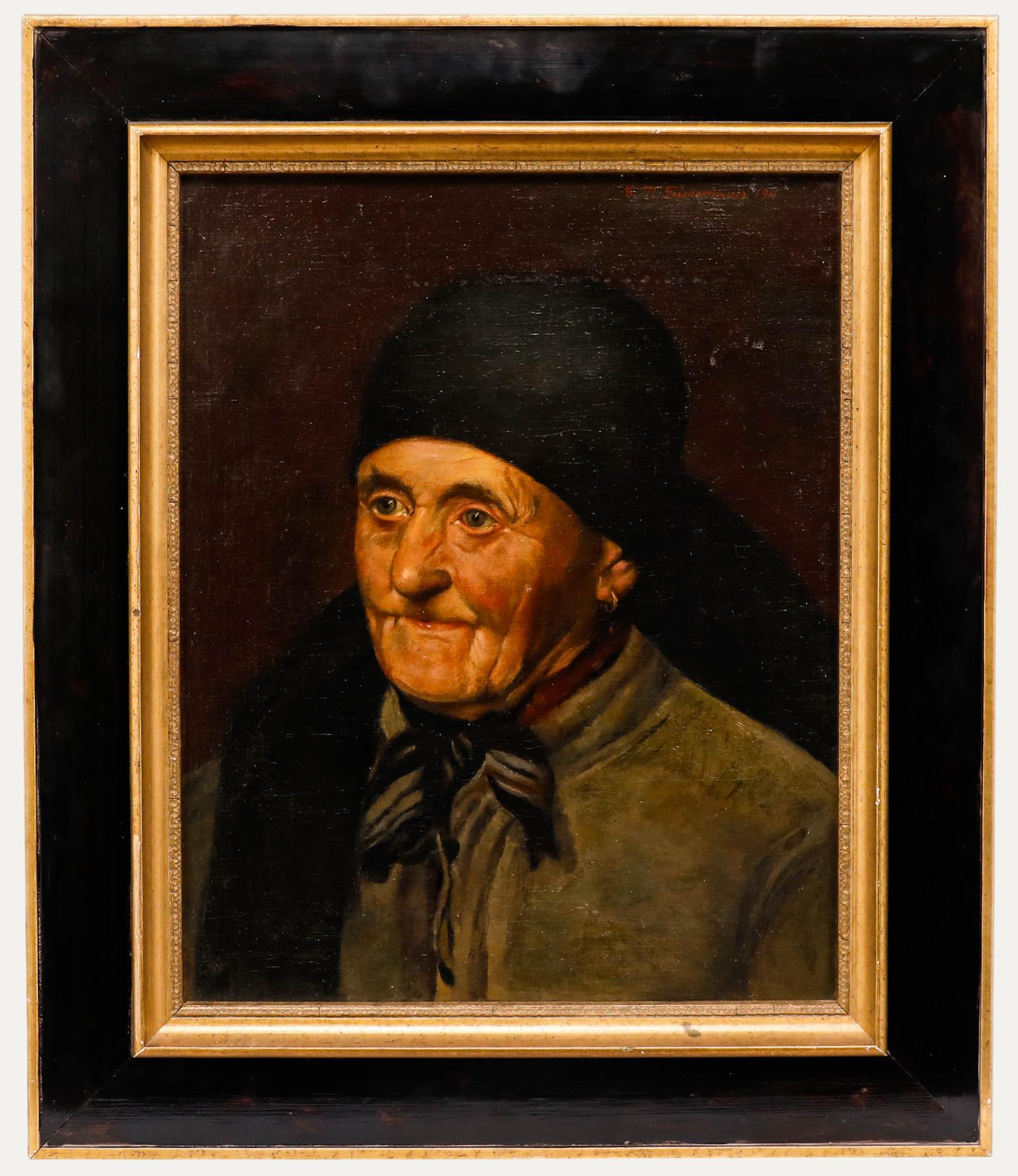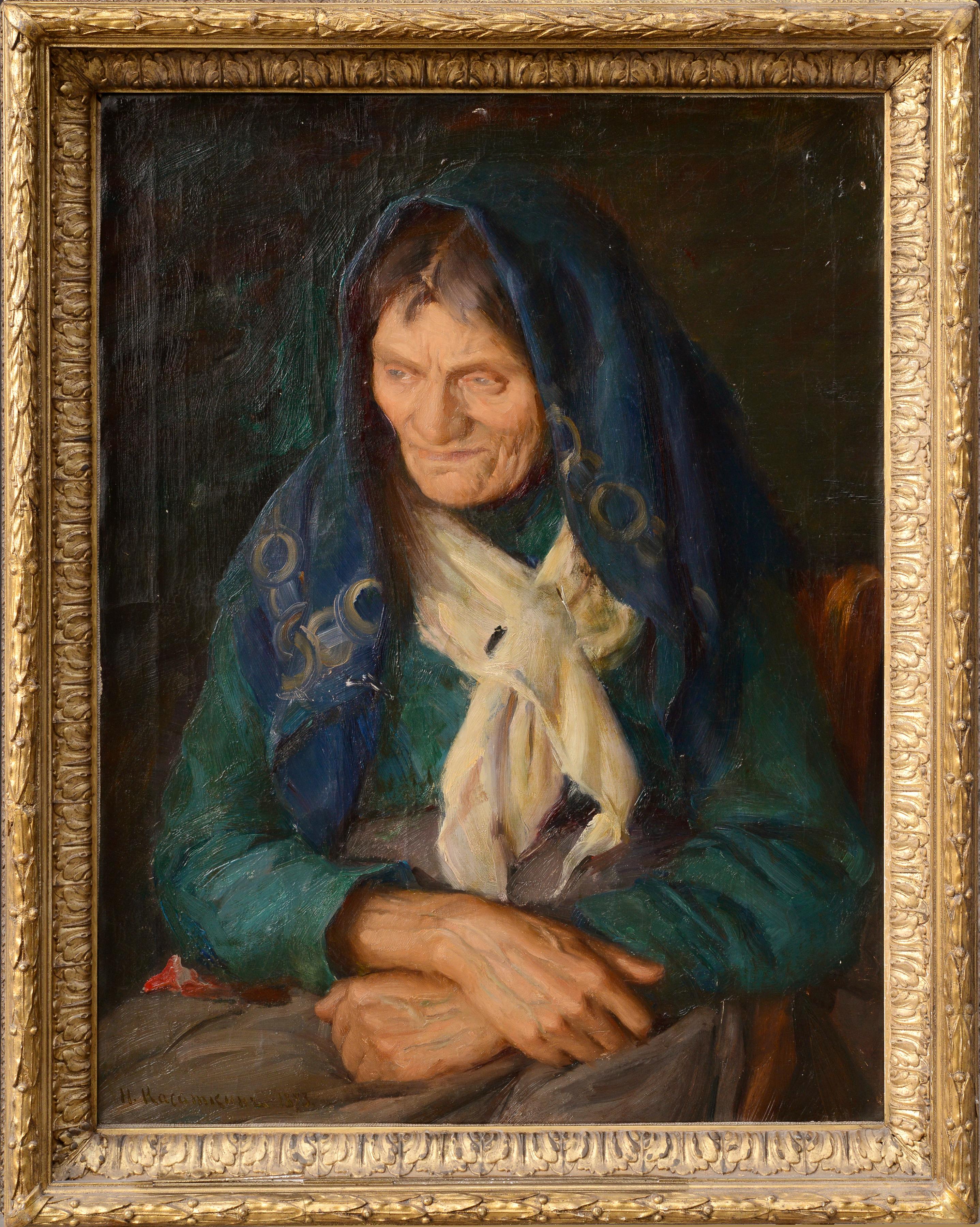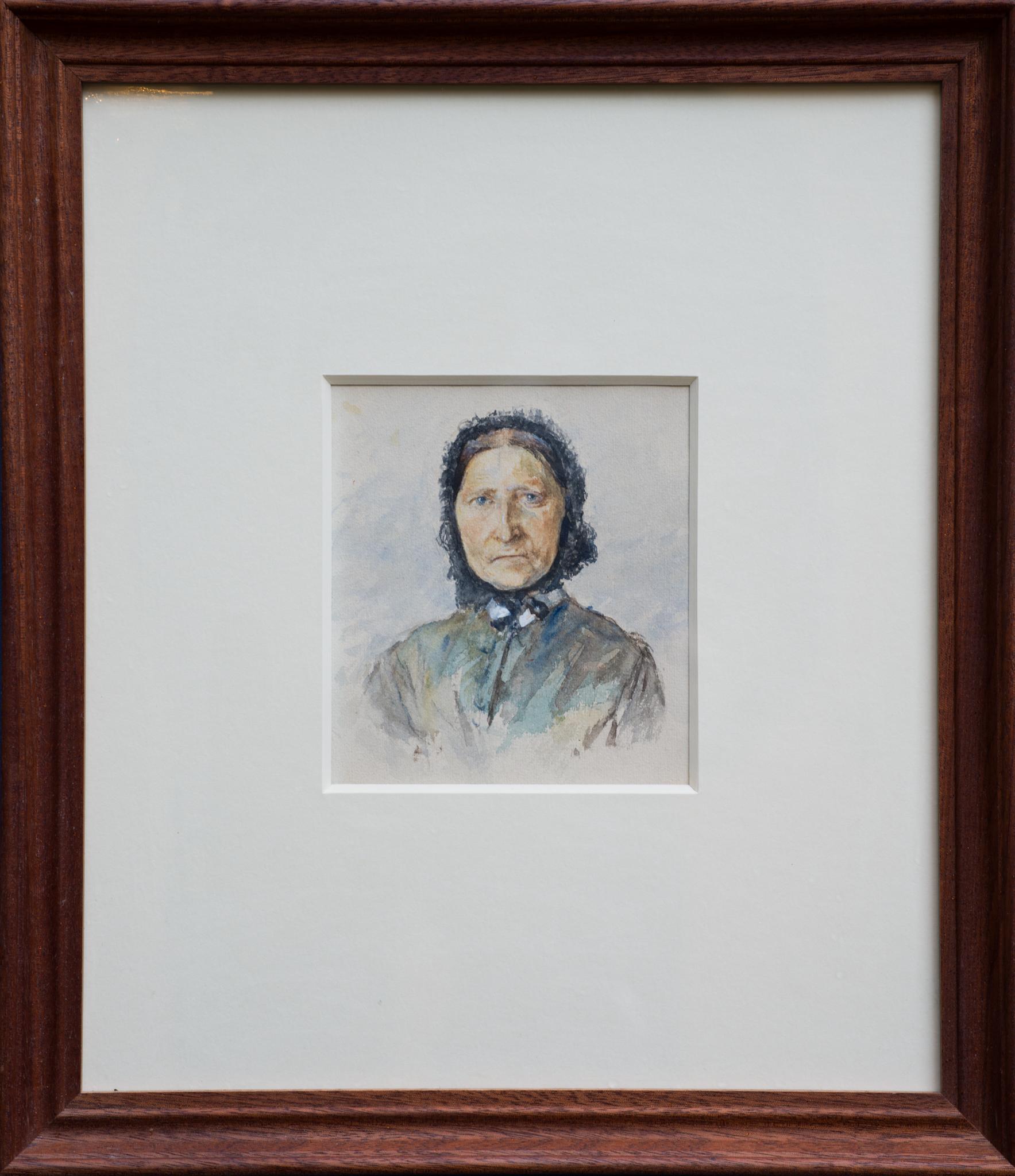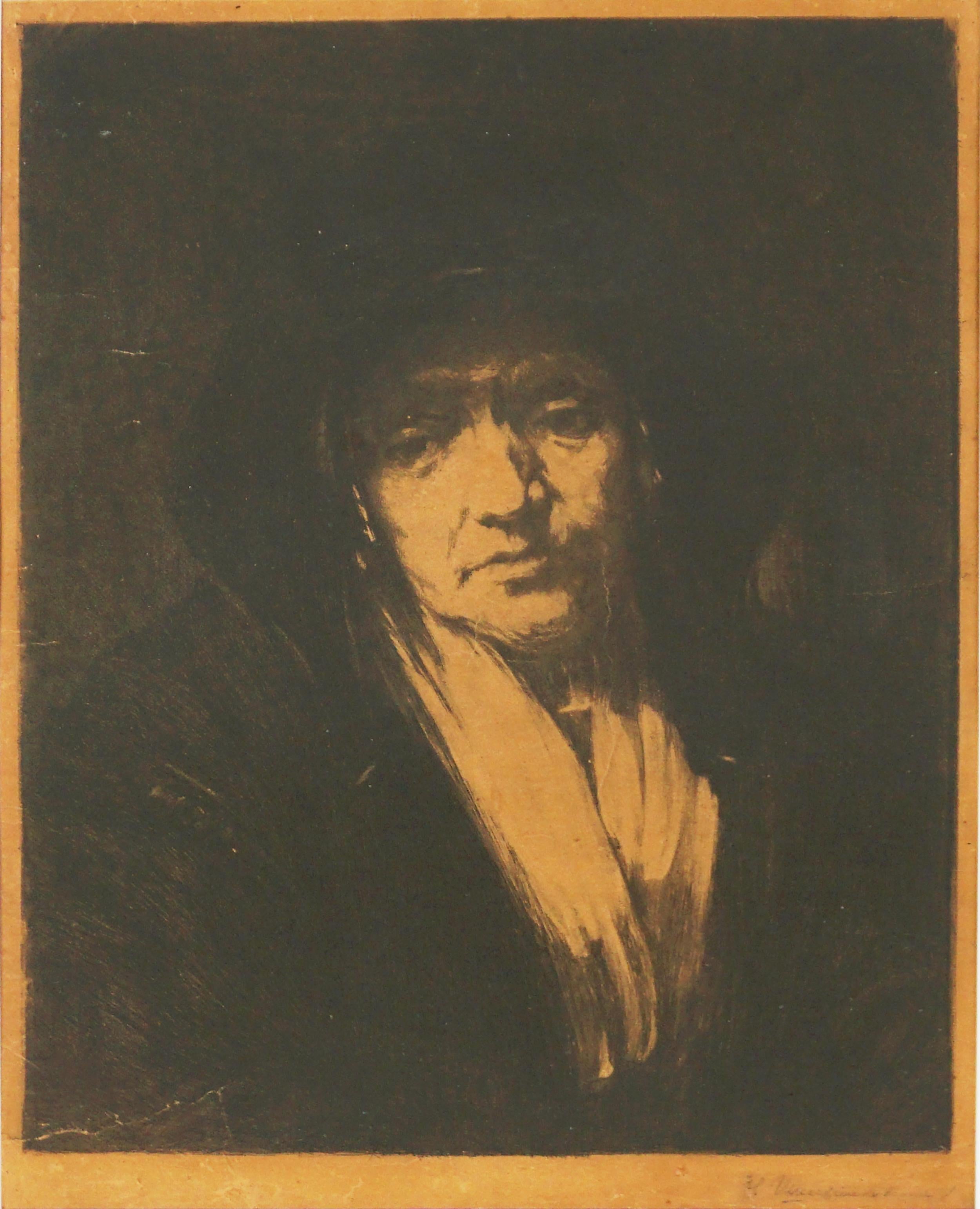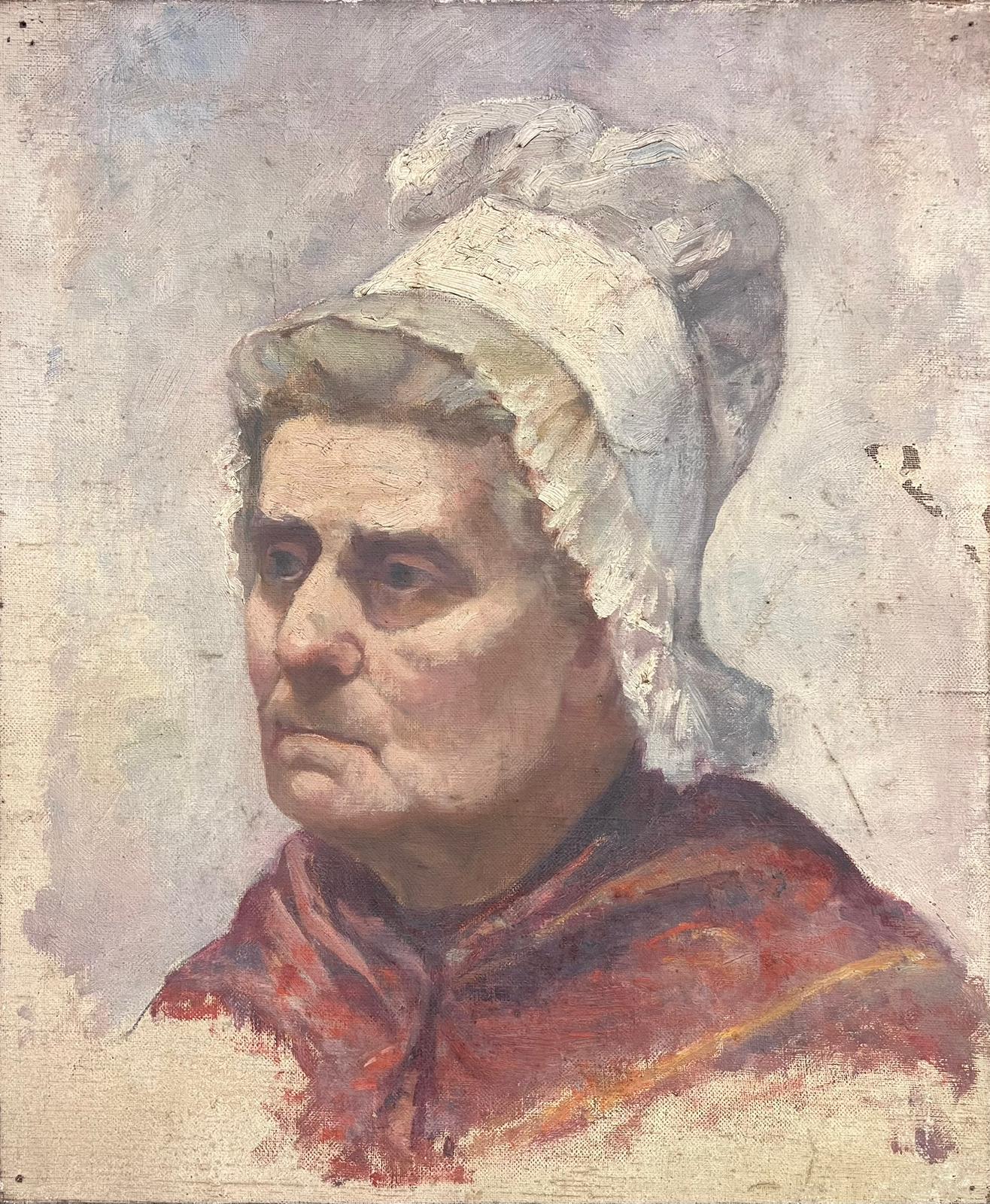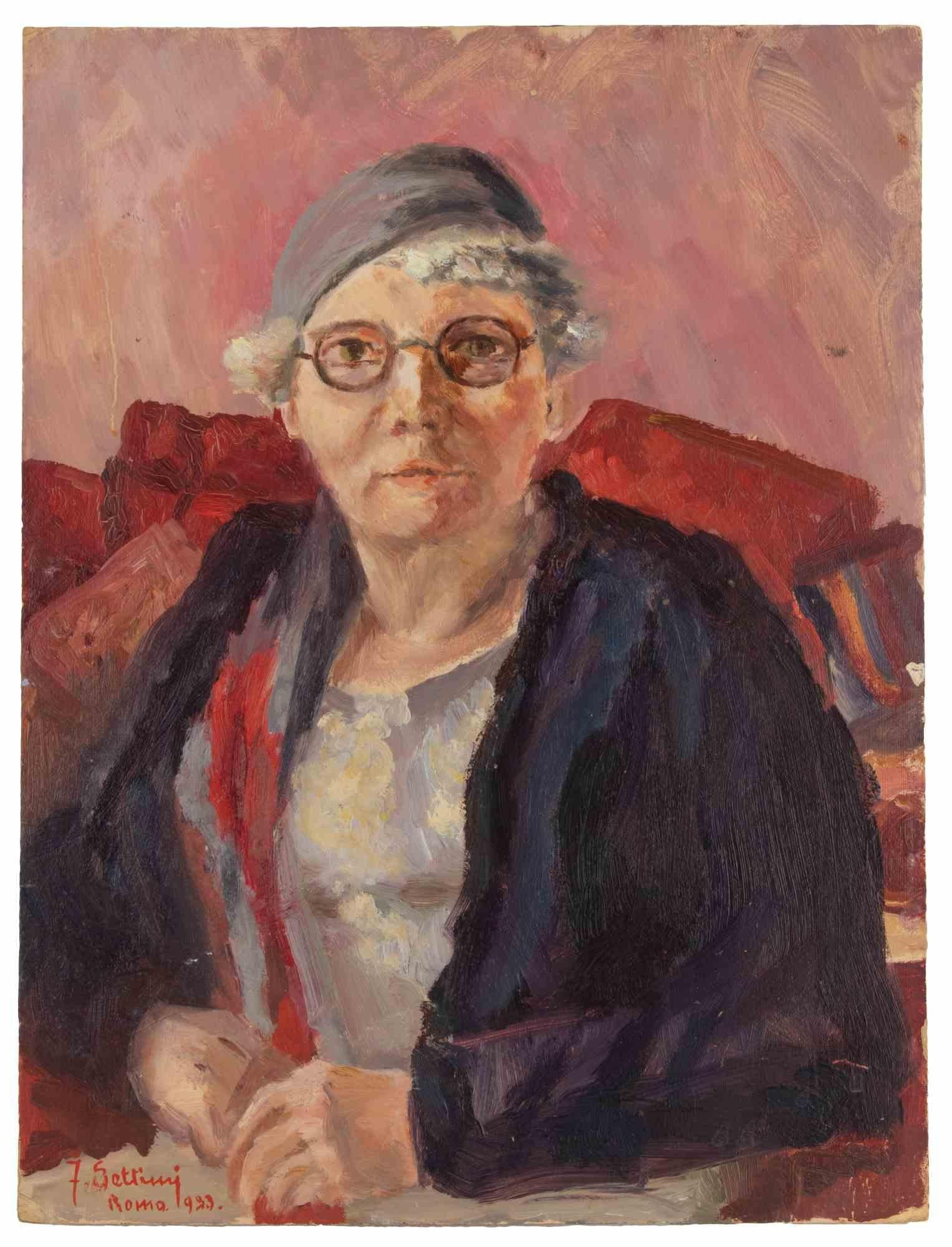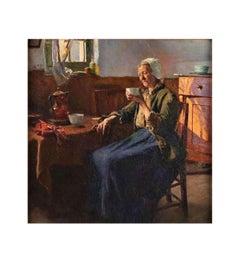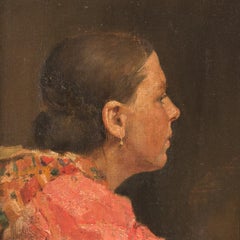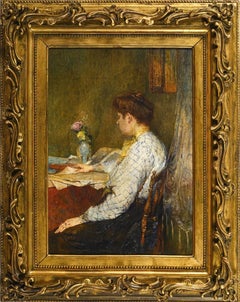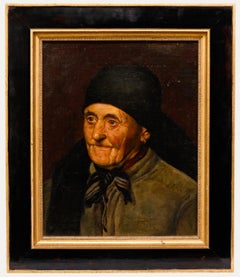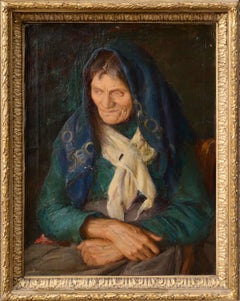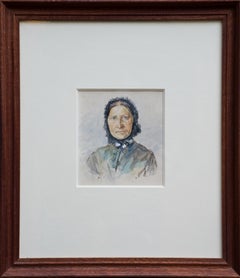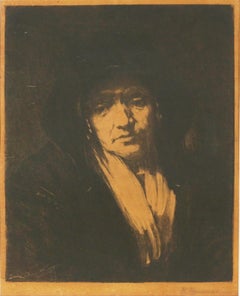Items Similar to Edmond De Maertelaere (1876 - 1938) Old woman, Pont Aven
Want more images or videos?
Request additional images or videos from the seller
1 of 14
Edmond De MaertelaereEdmond De Maertelaere (1876 - 1938) Old woman, Pont Aven
$11,533.39
£8,572.44
€9,688
CA$15,924.44
A$17,659.02
CHF 9,278.51
MX$215,763.24
NOK 116,086.77
SEK 108,967.27
DKK 73,769.27
About the Item
Edmond De Maertelaere was born in Ghent on 8 October 1876.
At the age of 14, Edmond won a first prize in decorative drawing at the Nivelines school. He then enrolled at the "Royal Academy of Drawing, Sculpture and Architecture of the City of Ghent", as it was known at the time. He left this institution in 1898 as a laureate, receiving the gold medal and a bonus of three thousand francs. With this money, which at the time represented a small fortune, Edmond De Maertelaere went to Paris and studied for two years at the Académie Julian. The grant also enabled him to travel to Florence, Rome, Vienna and Munich to study the work of the great masters. In Pont-Aven, Brittany, he found an ideal artistic climate.
After his period in Paris, Edmond De Maertelaere moved to the St. Elisabeth beguinage in Ghent, where he lived for the rest of his life. Once appointed professor at the Ghent Academy, he showed remarkable restraint. He took part in neither the large official group exhibitions nor the local group exhibitions. On the one hand, his consistent independent nature worked against the spread of his name. At the same time, however, he had the advantage that his drawings, watercolors, gouaches, pastels and paintings were appreciated and bought by a public of connoisseurs.
Edmond De Maertelaere loved Ostend and often stayed there. For his time, this artist was a man who travelled a lot and worked, and frequently exhibited abroad. He visited Germany, England, France, Italy, the Netherlands, Austria, Spain and Switzerland on several occasions.
In addition to all this, he also designed numerous posters, for example, for the Ghent Floralies, stained-glass windows for churches, illustrated books and painted numerous murals.
Edmond De Maertelaere belongs to this generation of artists, most of whom were relegated to the background by the rise of Expressionism between the two world wars. Poetic realism, influenced here and there by symbolism, was no longer rooted in an atmosphere of ideoplastic expression and language. De Maertelaere has received numerous prizes, first prizes and other official recognition in Belgium and abroad. His works can be found in museums in Ghent (including the Museum of Fine Arts), Sao Polo, Rio de Janeiro, Texas, Vienna, Stockholm and in numerous private collections.
- Creator:Edmond De Maertelaere
- Dimensions:Height: 31.5 in (80 cm)Width: 31.5 in (80 cm)
- More Editions & Sizes:80 x 80Price: $9,226
- Medium:
- Movement & Style:
- Period:
- Condition:
- Gallery Location:Gent, BE
- Reference Number:1stDibs: LU2140213698962
About the Seller
5.0
Vetted Professional Seller
Every seller passes strict standards for authenticity and reliability
Established in 2018
1stDibs seller since 2022
5 sales on 1stDibs
Typical response time: 2 hours
- ShippingRetrieving quote...Shipping from: Gent, Belgium
- Return Policy
Authenticity Guarantee
In the unlikely event there’s an issue with an item’s authenticity, contact us within 1 year for a full refund. DetailsMoney-Back Guarantee
If your item is not as described, is damaged in transit, or does not arrive, contact us within 7 days for a full refund. Details24-Hour Cancellation
You have a 24-hour grace period in which to reconsider your purchase, with no questions asked.Vetted Professional Sellers
Our world-class sellers must adhere to strict standards for service and quality, maintaining the integrity of our listings.Price-Match Guarantee
If you find that a seller listed the same item for a lower price elsewhere, we’ll match it.Trusted Global Delivery
Our best-in-class carrier network provides specialized shipping options worldwide, including custom delivery.More From This Seller
View AllOil on pannel "The old fisherman woman" By Boudry Aloïs (1851-1938)
Located in Gent, VOV
This captivating oil on panel painting by Belgian artist Aloïs Boudry (1851-1938) is a testament to his mastery of realism. Titled "The Old Fisherman Woman," the artwork depicts a we...
Category
Late 19th Century Realist Figurative Paintings
Materials
Oil
Demetrio COSOLA (1851 – 1895) Portrait of a woman Oil on canvas
Located in Gent, VOV
Cosola Demetrio (1851-1895)
Demetrio Cosola lived his entire short life between Chivasso and Turin. At the age of eighteen he entered the Accademia Albertina in Turin, where he becam...
Category
19th Century Portrait Paintings
Materials
Canvas, Oil
Woman reading, oil on canvas, circa 1896
Located in Gent, VOV
This exquisitely rendered painting captures a moment of serene introspection — a fleeting glimpse into the stillness of domestic life. The young woman, immersed in her reading, is no...
Category
Late 19th Century Victorian Portrait Paintings
Materials
Oil
Woman Reading, Oil on canvas circa 1896
Located in Gent, VOV
This exquisitely rendered painting captures a moment of serene introspection — a fleeting glimpse into the stillness of domestic life. The young woman, immersed in her reading, is no...
Category
19th Century Portrait Paintings
Materials
Oil
Van Aken Leo (1857-1904)+Original oil on canvas, Mater Dolorosa
Located in Gent, VOV
Mater Dolorosa
Mater Dolorosa is part of a series of paintings which Leo Van Aken developed around the theme of suffering. It was conceived around the same time Leo Van Aken painted...
Category
Late 19th Century Academic Figurative Paintings
Materials
Oil
Afternoon tea , 1912 Oil on canvas Auguste Moreau-Deschanvres (1838-1913)
Located in Gent, VOV
Auguste Moreau-Deschanvres (1838-1913)
A student of Julien Potier at the Valenciennes academic schools, the painter Auguste Moreau-Deschanvres (1838-1913) lived in the house-studio h...
Category
20th Century Figurative Paintings
Materials
Canvas, Oil
You May Also Like
C. M. Friedmaura - 1911 Oil, Portrait of an Elderly Woman
Located in Corsham, GB
This detailed portrait depicts an elderly figure wearing a dark headscarf and neckerchief, rendered with careful attention to the weathered features and gentle expression that speak ...
Category
Early 20th Century Portrait Paintings
Materials
Oil
Portrait of Old Woman 1893 by Famous Russian Master Oil Painting on Canvas Frame
Located in Stockholm, SE
Attributed by Nikolay Alekseyevich Kasatkin (1859 - 1930). In this touching artwork, the artist perfectly conveyed the character of the old woman, who has seen a lot in her life. The hands, tired out and riddled with veins, lie helplessly on the knees. Her slouched body tells us about the load of years lived. The painter skillfully conveys a sense of wisdom, kindness, and humility through her wrinkled face and detached gaze. The painting exudes warmth with a subtle touch of sadness and reflection on a life lived. Thanks to moderately contrasting colors, the portrait comes to life and shows us the depth of the artist's intention. Kasatkin not only continued the traditions of the best masters of portraiture in Russia in the 19th century, but also introduced new principles into it. He sought to display on canvas not only the external features of a person, but also to demonstrate his spiritual world. Antique oil painting on canvas, signed bottom left, framed.
Size app.: 68.5 x 52.3 cm (roughly 27 x 20.6 in), frame is 80.5 x 63.5 cm (roughly 31.7 x 25 in). Very good condition, very well preserved recently conserved condition with minimal wear (notice few micro losses here and there). Please study good resolution images for cosmetic condition. In person actual painting may appear darker or brighter than in our pictures, strictly depending on sufficient light in your environment. Weight of app. 5.4 kg is going to measure 8 kg packed for shipment.
Nikolay Alekseyevich Kasatkin (1859 - 1930) was a Russian painter, considered to be one of the founders of Social Realism in Russia. From 1873 to 1883 he studied at the Moscow School of Painting, Sculpture and Architecture with Vasily Perov and Illarion Pryanishnikov. Upon graduating, he received a medal for his painting "Beggars at the Church Door". In 1891, he began exhibiting with the Peredvizhniki and, from 1894 to 1917, was a teacher at his alma mater. For thirty years, beginning in 1883, he worked with Ivan Sytin, providing illustrations for his popular almanac/calendars and teaching lithography. He also contributed The Great Reform, an encyclopedia that celebrated the fiftieth anniversary of the Emancipation (1861), and a collection called "Russian History in Pictures". In 1903, he became a member of the Imperial Academy of Arts. He participated in the Exposition Universelle (1900), where he won a silver medal, and the Louisiana Purchase Exposition (1904), among others. In 1923, following the Civil War, he was named the first "People's Artist of the Republic" and became a member of the AKhRR (Association of Artists). He is considered to be one of the forerunners of Socialist Realism in the arts and was sometimes called the "Gorky of Painters". In 1956, the Soviet Union honored him with a 40 kopeck commemorative postage stamp. In 1971, his painting of a female mine worker...
Category
Late 19th Century Realist Portrait Paintings
Materials
Canvas, Wood, Oil
Portrait of an Old Lady, 1886
Located in Stockholm, SE
This small and delicate watercolor is believed to depict Madame Papillon, a subject also portrayed by Hanna Pauli in an oil painting dated 1886. The portrait was created during the s...
Category
1880s Portrait Drawings and Watercolors
Materials
Watercolor
Original Study of Rembrandt’s Portrait of an Old Woman
Located in Soquel, CA
Early 20th Century Study of Rembrandt’s Portrait of Old Woman Russian for Niello Engraving
A wonderful study of Rembrandt’s portrait of an Old Woman used for Niello engraving by Ru...
Category
Early 20th Century Old Masters Portrait Paintings
Materials
Paper, Ink
$1,040 Sale Price
20% Off
1900's French Impressionist Portrait of an Elderly Lady Beautifully Painted Oil
Located in Cirencester, Gloucestershire
Portrait of a Lady
French School, early 20th century
oil on canvas, unframed
canvas: 18 x 15 inches
provenance: private collection
condition: some wear, scuffing and signs of age but...
Category
Early 20th Century Impressionist Portrait Paintings
Materials
Oil
Portrait of Old Woman - Painting by Francesco Settimj - 1930s
Located in Roma, IT
Oil on plywood realized in 1930s.
Painted on both sides, recto and verso.
Good condition.
Category
1930s Modern Figurative Paintings
Materials
Oil
More Ways To Browse
Antique Old World Art
German Portraits 19th Century
Old Antique Stained Glass Windows
Polo Poster
Vintage Breastfeeding Art
Warhol Witch
Alex Katz Orange Hat
Artemio Rodriguez
Frank Sinatra Hirschfeld
Kaws What Party Print
Kaws What Party White
Le Petit Prince Vintage
Peter Max Toulouse
Russell Young Marilyn Crying
Warhol Dracula
Andy Warhol Beethoven
Andy Warhol Ingrid Bergman
Andy Warhol Rebel Without A Cause
